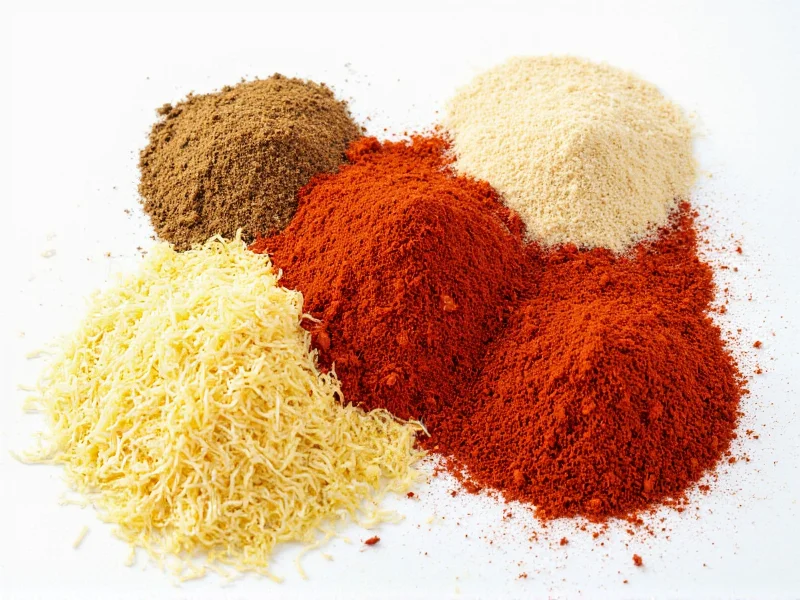Creating the perfect spaghetti dish hinges on understanding which spices complement tomato-based sauces while enhancing the pasta's natural flavors. While many assume Italian cooking relies heavily on complex spice blends, authentic spaghetti preparation actually emphasizes quality ingredients used thoughtfully rather than overwhelming spice mixes. The magic happens when you understand how each spice contributes to the overall flavor profile and when to introduce them during cooking.
Core Spices for Traditional Spaghetti
Italian cuisine values simplicity and quality over quantity when it comes to spices. The following ingredients form the essential foundation for most spaghetti dishes:
- Red pepper flakes (peperoncino) - Provides gentle heat that balances tomato acidity
- Dried oregano - Offers earthy, slightly bitter notes that complement tomatoes
- Fresh basil - Adds bright, sweet notes (always added at the end of cooking)
- Garlic - Creates aromatic depth (use whole cloves for subtle flavor, minced for stronger impact)
- Freshly ground black pepper - Enhances other flavors without overpowering
Regional Spice Variations Across Italy
Italy's regional diversity means spaghetti spice profiles vary significantly from north to south. Understanding these differences helps create more authentic dishes:
| Italian Region | Signature Spices | Traditional Applications |
|---|---|---|
| Southern Italy | Generous red pepper flakes, oregano | Spicy tomato sauces, seafood pasta |
| Central Italy | Black pepper, minimal garlic | Cacio e pepe, tomato-based sauces |
| Northern Italy | Rarely spicy, more herb-focused | Cream-based sauces, meat ragù |
| Sicily | Wild fennel, saffron | Seafood spaghetti, pesto variations |
Advanced Spice Techniques for Perfect Spaghetti
Mastering spaghetti seasoning requires understanding not just which spices to use, but when and how to incorporate them:
Timing Matters: When to Add Spices
The sequence of spice addition dramatically affects flavor development:
- Early in cooking - Whole garlic cloves, bay leaves, and dried oregano release flavors slowly during simmering
- Middle phase - Red pepper flakes and fennel seeds bloom in olive oil before adding tomatoes
- Finishing touches - Fresh basil, parsley, and black pepper preserve volatile aromatic compounds
Spice Ratios for Balanced Flavor
Professional chefs follow these proportions for perfectly seasoned spaghetti sauce (per 28oz can of tomatoes):
- 1-2 whole garlic cloves (remove before serving)
- ½ teaspoon dried oregano
- ¼-½ teaspoon red pepper flakes (adjust to heat preference)
- 3-4 fresh basil leaves (torn, not chopped)
- 6-8 grinds fresh black pepper
- 1 bay leaf (removed after 20 minutes)
Common Spaghetti Spice Mistakes to Avoid
Even experienced home cooks make these frequent errors when seasoning spaghetti:
- Adding dried herbs too late - Dried oregano needs 15-20 minutes simmering to fully develop flavor
- Using dried basil instead of fresh - Dried basil becomes bitter in tomato sauces
- Over-salting early - Salt draws moisture from tomatoes, creating watery sauce
- Burning garlic - Garlic scorches at 325°F, creating bitter compounds
- Adding all spices at once - Different spices require different infusion times
Enhancing Store-Bought Sauce with Strategic Spicing
When using quality store-bought spaghetti sauce, these spice additions transform it from ordinary to exceptional:
- For basic tomato sauce - Add 1 minced garlic clove sautéed in olive oil, ½ tsp red pepper flakes, and fresh basil
- For meat-based sauces - Include ¼ tsp fennel seeds with the meat for authentic sausage flavor
- For depth without heat - Simmer with 1-2 anchovy fillets (they dissolve completely)
- For brightness - Finish with lemon zest and fresh parsley
Remember that spaghetti seasoning should enhance, not mask, the natural flavors of quality ingredients. The best spaghetti dishes achieve balance where no single spice dominates, but together they create a harmonious flavor profile that complements both the sauce and pasta. When experimenting with spices for spaghetti sauce, start with smaller amounts and taste frequently—spices intensify as sauces simmer, and it's easier to add more than correct an over-seasoned dish.
What's the difference between spaghetti spices and pizza spices?
Spaghetti typically uses more subtle spice profiles focused on enhancing tomato flavors, with moderate red pepper flakes and emphasis on oregano and basil. Pizza spices often contain higher concentrations of oregano and sometimes include marjoram, with less emphasis on heat. Authentic Italian spaghetti rarely includes the fennel seeds common in American-style pizza seasoning.
Can I use Italian seasoning for spaghetti?
While convenient, most commercial Italian seasoning blends contain herbs better suited for other dishes. They often include too much rosemary and thyme, which overpower delicate spaghetti sauces. For authentic results, select individual spices rather than pre-mixed blends when preparing traditional spaghetti.
How do I fix spaghetti that's too spicy?
If your spaghetti sauce has become too spicy from red pepper flakes, add acidity to balance the heat. Stir in small amounts of tomato paste, a squeeze of lemon juice, or a teaspoon of sugar. Dairy like a splash of cream or grated Parmesan can also help moderate excessive heat without altering the fundamental flavor profile.
Should I add spices to the pasta water?
No, adding spices to pasta water is generally ineffective as pasta doesn't absorb flavors well from boiling water. Instead, focus on seasoning your sauce properly. The exception is salt—always generously salt your pasta water (about 1-2 tablespoons per gallon) as this is the only opportunity to season the pasta itself.
What spices work best with spaghetti carbonara?
Traditional spaghetti carbonara requires minimal spices—primarily freshly cracked black pepper. The pepper's floral notes complement the richness of eggs and guanciale without competing with delicate flavors. Avoid red pepper flakes or dried herbs in authentic carbonara, as they disrupt the sauce's delicate balance. Some Roman chefs add a tiny pinch of nutmeg for complexity.











 浙公网安备
33010002000092号
浙公网安备
33010002000092号 浙B2-20120091-4
浙B2-20120091-4